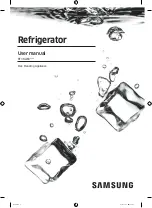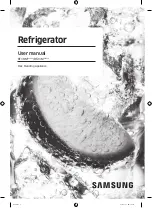
6
• Install the refrigerator in the most cool part of the room, out of direct sunlight and
away from heating ducts or registers. Do not place the refrigerator next to heat-
producing appliances such as a range, oven or dishwasher. If this is not possible,
a section of cabinetry or an added layer of insulation between the two appliances
will help the refrigerator operate more efficiently.
• Level the refrigerator so the doors close tightly.
• Refer to this Owner's Guide for the suggested refrigerator settings.
• Periodic cleaning of the condenser will help the refrigerator run more efficiently.
See Outside in the
Care and Cleaning
section.
• Do not overcrowd the refrigerator or block cold air vents. Doing so causes the
refrigerator to run longer and use more energy. Shelves should not be lined with
aluminum foil, wax paper or paper toweling. Liners interfere with cold air
circulation, making the refrigerator less efficient, which could cause food
spoilage.
• Cover foods and wipe containers dry before placing them in the refrigerator. This
cuts down on moisture build-up inside the unit.
• Organize the refrigerator to reduce door openings. Remove as many items as
needed at one time and close the door as soon as possible.
Setting the Controls
Cool Down Period
To ensure safe food storage, allow the refrigerator to operate with the doors closed
for at least 8 to 12 hours before loading with food.
Refrigerator Control
• The refrigerator control should be set at the midpoint of the dial for a trial period
of 24 hours.
• After 24 hours, adjust the control as needed. For colder temperatures, turn the
dial a notch toward
COLDEST
. For warmer temperatures, turn the dial a notch
toward
COLD
. Adjust temperatures by one increment at a time.
Freezer Control
• The freezer control should be set at the midpoint of the dial for a trial period of
24 hours.
• After 24 hours, adjust the control as needed. For colder temperatures, turn the
dial a notch toward
COLDEST
. For warmer temperatures, turn the dial a notch
toward
COLD
. Adjust temperatures by one increment at a time.
NOTE:
When first setting the controls or when changing a setting, wait 24 hours for
the temperature to stabilize before making additional changes.
Turning the freezer control may change temperatures in both compartments. For
example, if the freezer control is turned to a colder setting, the refrigerator control
may have to be adjusted to a warmer one. Turning the refrigerator control will
change only the refrigerator temperature.
IMPORTANT:
If the freezer control is turned to OFF, cooling stops in both
compartments.
You may hear the "Frost Free" system working. A fan circulates air in the
refrigerator and freezer compartments. For good circulation and maintenance of
proper cooling temperatures, do not block cold air vents with food items. Water
draining into the defrost water pan and hissing sounds are normal during the
automatic "Frost Free" cycle.
Energy Saving Ideas
Freezer Control
Refrigerator Control
Freezer Control






































